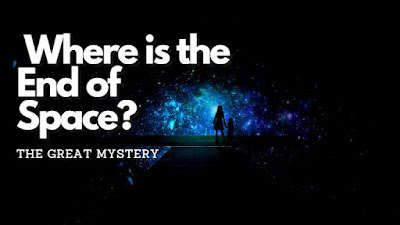 |
| The Great Mystery: Where is the End of Space? |
Space, the final frontier, is one of the most intriguing and mysterious aspects of our universe. For centuries, humans have been captivated by the idea of exploring the vast reaches of space. But what lies beyond our observable universe? Is there an end to the universe, or does it continue indefinitely? In this article, we’ll delve into the latest scientific theories and try to answer the age-old question: where is the end of space?
I. What is the observable universe?
Before we can discuss the end of space, we first need to understand what we mean by “observable universe.” The observable universe is the portion of the universe that we can observe, based on the light that has reached us. According to current estimates, the observable universe is approximately 93 billion light-years in diameter. However, scientists believe that there is much more to the universe beyond what we can see.
II. What lies beyond the observable universe?
Theories about what lies beyond the observable universe range from the possible existence of parallel universes to the concept of a “false vacuum.” One popular theory is that the universe is infinite and unbounded, meaning that it has no edge and continues forever. Another theory is that the universe is finite and bounded, meaning that it has an edge and ends somewhere.
Also Read : About Elon Musk
III. The theory of an expanding universe
One of the most widely accepted theories about the end of space is the theory of an expanding universe. According to this theory, the universe began with the Big Bang, an explosion that occurred approximately 13.8 billion years ago. Since the Big Bang, the universe has been expanding, and it is believed that this expansion will continue indefinitely.
IV. The limits of the universe
Despite the theories about an expanding universe, there are still limits to what we know about the universe. For example, we don’t yet know what caused the Big Bang, and we don’t know what lies beyond the edge of the observable universe. However, as technology advances and our understanding of the universe grows, we may one day be able to answer these questions and discover the true nature of the universe.
V. Dark Energy and Dark Matter
Another aspect to consider in the search for the end of space is the role of dark energy and dark matter. Dark energy is a mysterious force that is believed to be causing the expansion of the universe to accelerate. Dark matter, on the other hand, is believed to make up approximately 27% of the universe, although it does not interact with light or other forms of electromagnetic radiation, making it difficult to detect and study.
VI. The Multiverse theory
Another theory that has gained popularity in recent years is the idea of a multiverse, or multiple universes. According to this theory, there may be an infinite number of universes beyond our own, each with its own unique characteristics and physical laws. This theory raises many questions about the nature of reality and the universe, and it is still the subject of much debate among scientists and philosophers.
VII. The Future of Space Exploration
As our understanding of the universe continues to evolve, so too will our efforts to explore the reaches of space. With the development of new technologies and the continued pursuit of scientific knowledge, we may one day be able to answer the question of where the end of space is and unlock the secrets of the universe.
Conclusion:
In conclusion, the question of where the end of space is remains one of the greatest mysteries of our time. While we have some theories about the nature of the universe, there is still much that we don’t know. However, with advancements in technology and our understanding of the universe, we may one day be able to answer this age-old question and unlock the secrets of the universe. Whether the universe is infinite and unbounded, or finite and bounded, one thing is certain: the mysteries of space continue to captivate and inspire us.
The end of space is still a great mystery, and theories range from an infinite and unbounded universe to a finite and bounded one. The theory of an expanding universe is widely accepted, and the role of dark energy and dark matter is also significant. The multiverse theory suggests the possibility of multiple universes, and space exploration may help unlock the secrets of the universe. However, there is still much that we don’t know, and the mysteries of space continue to captivate and inspire us.
In recent years, the search for the end of space has also led to the development of new areas of physics, such as string theory and quantum gravity. These theories seek to reconcile our understanding of the universe on the largest and smallest scales, and may one day help us answer some of the deepest questions about the nature of the universe.





